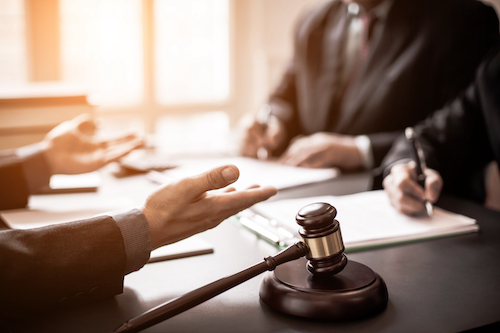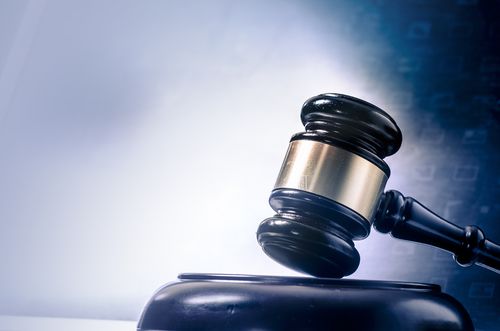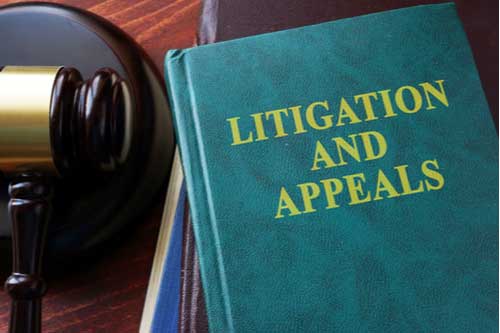When you have been granted damages in your trial and are eager to enforce the judgment promptly, encountering a defendant’s request for a stay of court proceedings can bring about certain expectations. A stay essentially entails the suspension of the judgment while the defendant pursues an appeal against the decision made by the trial court.
In such circumstances, it is crucial to be aware of the implications and practical considerations involved. Gusdorff Law offers valuable insights into what you should anticipate when faced with a defendant’s request for a stay.
Understanding the different types of stays and the conditions under which they are granted is essential for both plaintiffs and defendants.
Understanding the Concept of a Stay in Court
A stay of proceedings, also referred to as a stay of execution, is a court order that temporarily halts the enforcement of a trial court’s decision. This allows the appellate court to review the case without the risk of irreparable harm to the defendant.
There are several types of stays, each with different implications. For example, certain trial court decisions, such as declaratory judgments, are automatically stayed upon filing an appeal, requiring no additional actions from the defendant apart from proceeding with the appeal.
Other judgments, such as those not automatically stayed, require the defendant to make a formal request for a stay and fulfill additional requirements, such as posting an appeal bond or undertaking. Additionally, mandatory injunctions are automatically stayed without further action, whereas prohibitory injunctions require a stay order from the appellate court or a writ of supersedeas to halt enforcement.
Understanding the different types of stays and the conditions under which they are granted is essential for both plaintiffs and defendants.
Types of Stays and Their Implications
Automatic Stay:
- Certain trial court decisions, such as declaratory judgments, are automatically stayed upon filing an appeal.
- No monetary payment or land exchange is involved.
- The defendant does not need to take additional actions apart from proceeding with the appeal.
Non-Automatic Stay:
- Judgments not automatically stayed require the defendant to make a formal request for a stay.
- The defendant must fulfill additional requirements, such as posting an appeal bond or undertaking.
Mandatory Injunctions:
- Automatically stayed without requiring any further action from the defendant.
Prohibitory Injunctions:
- Require a stay order from the appellate court or a writ of supersedeas to halt enforcement.
Property-Related Judgments:
- Actions like the sale or foreclosure of property can be stayed by posting security.
- The defendant provides financial assurance to pause execution during the appeal.
Determining When a Defendant Should Request a Stay
Understanding when a defendant should request a stay and the implications of not doing so is crucial. Defendants may seek a stay to avoid immediate compliance with the trial court’s decision, especially when facing irreparable harm.
Defendants must often post security, such as an appeal bond, to obtain a stay, providing assurance that the plaintiff will be compensated if the appeal fails. Procedurally, the defendant must file a motion for a stay with the appellate court and demonstrate the potential for irreparable harm if the stay is not granted.
For example, a judgment mandating the sale of real property could result in an irreversible transaction, causing irreparable harm. A stay relieves the defendant from the immediate obligation to comply with the trial court’s decision, but they must take proactive steps to initiate and enforce the stay.
Practical Considerations for Defendants
Security Requirements:
- Defendants must often post security, such as an appeal bond, to obtain a stay.
- This provides assurance that the plaintiff will be compensated if the appeal fails.
Procedural Steps:
- Filing a motion for a stay with the appellate court.
- Demonstrating the potential for irreparable harm if the stay is not granted.
Defendants need to evaluate their specific situation carefully. For instance, in cases where the judgment involves significant financial transactions or property transfers, obtaining a stay becomes crucial to prevent irreversible damage.
Practical Considerations for Plaintiffs
Awareness:
- Understanding the defendant’s obligations and the likelihood of a stay being granted.
- Preparing for delays in the enforcement of the judgment.
Collateral Issues:
- The trial court retains jurisdiction over certain matters, such as:
- New trial motions
- Correcting clerical errors
- Awarding costs and statutory attorney fees
Plaintiffs should also be aware of how long the appellate process can take. Stays can prolong the enforcement of judgments, sometimes for years, depending on the complexity of the case and the court’s schedule.
Why The Defendant May Request a Stay
The primary objective of a stay is to maintain the existing state of affairs between the parties, preserving the contentious matter for the courts to adjudicate. By doing so, the stay helps ensure that any decision made by the appellate court will have a meaningful impact and relevance to the case.
Arguments for a Stay
Irreparable Harm:
- Defendants argue that without a stay, they would lose the benefits of an appeal.
- For example, a judgment mandating the sale of real property could result in an irreversible transaction, causing irreparable harm.
Immediate Obligation:
- A stay relieves the defendant from the immediate obligation to comply with the trial court’s decision.
- The defendant must take proactive steps to initiate and enforce the stay.
In addition to these points, defendants might also argue that the stay is necessary to prevent disruption in their business operations or to protect other parties involved in the case.
What to Expect Following a Trial
For plaintiffs, a stay can be frustrating as it delays the enforcement of a favorable judgment. However, understanding the process and being prepared can help manage these delays.
Plaintiffs should stay informed about the defendant’s actions regarding the stay, understand the timeline and procedural steps involved, and seek guidance from legal professionals to navigate the complexities of stays and appeals.
It is also important for plaintiffs to be aware of collateral issues, such as new trial motions, correcting clerical errors, awarding costs, and statutory attorney fees, as the trial court retains jurisdiction over these matters.
By keeping detailed records and preparing for potential delays in judgment enforcement, plaintiffs can better manage their expectations and mitigate the impact of a stay.
Practical Tips for Plaintiffs
Stay Informed:
- Keep abreast of the defendant’s actions regarding the stay.
- Understand the timeline and procedural steps involved.
Seek Guidance:
- Consult with legal professionals to navigate the complexities of stays and appeals.
- Prepare for potential delays in judgment enforcement.
Additionally, plaintiffs should keep detailed records of all interactions and filings related to the stay. This documentation can be crucial if there are disputes about the compliance or terms of the stay.
Expanded Understanding of Stayed Judgments in Court Proceedings
Understanding what it means when a judgment is stayed can be complex, but it is vital for navigating the legal landscape. When a court order is stayed, it means that the enforcement of the trial court’s decision is temporarily halted.
This can happen for several reasons, and the implications vary depending on the specifics of the case.
What Does a Stay Mean in Court?
In civil procedure, a stay of proceedings is a ruling by the court to halt the legal process. This can be requested by either party involved in the litigation.
The primary purpose of a stay is to preserve the status quo pending further court actions.
Types of Court Stays
Stay Pending Appeal:
- Most common type of stay.
- Prevents the enforcement of the district court’s decision until the appellate court reviews the case.
Stay of Execution:
- Stops the enforcement of a final judgment or court order, such as the collection of a money judgment.
Stay of Proceedings:
- Halts all court proceedings in a case, often used in bankruptcy cases to protect debtors from creditors.
When Can a Stay Be Requested?
A stay can be requested at different stages of the court proceedings. The defendant may request a stay immediately after the trial court’s ruling, especially if they plan to appeal the decision.
It is crucial to understand the circumstances under which a stay is appropriate and the procedural requirements involved.
Procedural Requirements for Obtaining a Stay
Filing a Motion:
- A formal request must be filed with the court.
- The motion should include reasons why the stay is necessary and any supporting evidence.
Posting a Bond:
- In many cases, the defendant may be required to post a bond or other security.
- This ensures that the plaintiff can recover damages if the appeal fails.
Factors Considered by the Court
Irreparable Harm:
- The court considers whether the defendant will suffer irreparable harm without the stay.
- Examples include the sale of property or significant financial loss.
Public Interest:
- The court also weighs the public interest.
- For example, if a stay would harm public welfare, it might be denied.
Balance of Equities:
- Courts may also consider the balance of equities, assessing which party would suffer more harm if the stay is or isn’t granted.
The Role of Different Courts in Granting a Stay
Different courts have roles in granting stays depending on the stage of litigation. Understanding which court to approach and the specific rules that apply is crucial.
Trial Court
Initial Requests:
- The trial court often handles initial requests for stays.
- It retains jurisdiction over certain procedural matters even if the stay is granted.
Appellate Court
Review and Decisions:
- If the trial court denies a stay, the appellate court can review the decision.
- The appellate court can issue a stay if it finds that the trial court’s decision was incorrect or if new evidence warrants it.
In some cases, higher courts like the Supreme Court may also be involved, especially if the case has significant legal implications or involves complex legal questions.
Implications of a Stay for Plaintiffs
For plaintiffs, a stay can be frustrating as it delays the enforcement of a favorable judgment. However, understanding the process and being prepared can help manage these delays.
Managing Expectations
Timeline Awareness:
- Be aware of the potential length of the appellate process.
- Understand that stays are temporary and aim to preserve the status quo.
Financial Considerations:
- Prepare for potential delays in receiving monetary judgments.
- Consult with legal and financial advisors to plan accordingly.
Legal Strategies
Opposing a Stay:
- Plaintiffs can file a response opposing the stay.
- This response should argue why the stay is unnecessary and highlight any potential harm to the plaintiff.
Negotiating Settlements:
- In some cases, negotiating a settlement might be more beneficial than enduring prolonged litigation.
- This can expedite the resolution and provide certainty.
Plaintiffs might also consider other legal remedies to mitigate the impact of a stay, such as seeking a partial stay or requesting expedited appellate review.
Practical Tips for Defendants
Defendants seeking a stay should be aware of the procedural requirements and the strategic implications.
Ensuring Compliance
Meet All Requirements:
- Ensure all procedural requirements are met when filing for a stay.
- Posting the necessary bond or security promptly is crucial.
Strategic Considerations
Evaluating Irreparable Harm:
- Carefully evaluate and document any potential irreparable harm.
- This evidence can strengthen the case for a stay.
Public Interest Arguments:
- Highlighting how a stay serves the public interest can be persuasive.
- This is especially relevant in cases involving public policy issues.
Defendants should also consider the long-term implications of seeking a stay, including the potential impact on their reputation and relationships with other parties involved in the litigation.
Final Thoughts on Stays and Appeals
Understanding the intricacies of stays and appeals is vital for both plaintiffs and defendants. These legal tools serve to balance the interests of both parties while ensuring that justice is ultimately served.
By maintaining the status quo, stays provide the necessary time for higher courts to review and decide on the merits of the case.
Expert Legal Guidance for Your Stay and Appeal Needs
Navigating the complexities of stays and appeals can be challenging, but you don’t have to do it alone. At Gusdorff Law, we are committed to providing expert legal guidance to help you through every step of the process.
Whether you need assistance with filing for a stay, opposing a stay, or understanding the implications of an appellate court’s decision, our experienced attorneys are here to help.
Contact Gusdorff Law today at 818-877-4515 to schedule a consultation and ensure you are fully prepared for whatever legal challenges lie ahead. Our team is dedicated to protecting your rights and achieving the best possible outcome for your case.











